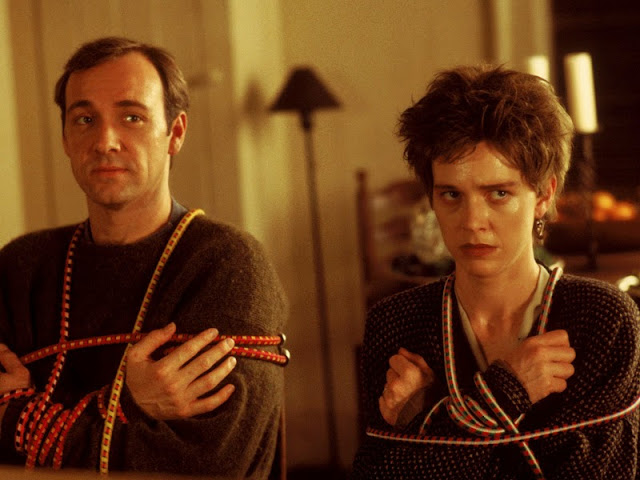On Christmas, Lloyd and Caroline Chasseur do not get to yell, but AFOS gets to do so. AFOS will stream the Ref score album by David A. Stewart of both Eurythmics and Lily Was Here theme fame all day long on Thursday, December 25. It's just like how TBS loops A Christmas Story all day long on Christmas or how TV stations still do that dumb thing where they loop footage of a yule log burning in a fireplace while playing shitty holiday music (I'd like to write and direct a short film all about the one poor sap who had to work at the local UHF station on Christmas--back when UHF stations were a thing--because he had to press the buttons that kept the "Yule Log" video running). I don't understand it. Why do TV stations still air "Yule Log" loops? Is it to simulate a fireplace for people who don't have fireplaces? Just light a rat on fire in a trash can and make that the "Yule Log." That's better than a fake fireplace that keeps playing Paul McCartney's "Wonderful Christmastime."
The "Yell Log" is my holiday gift to the one or two individuals out there who actually log on to AFOS on December 25. Director Ted Demme's acerbic 1994 comedy--starring Kevin Spacey and Judy Davis as the bickering Chasseurs and Denis Leary as a burglar who takes the yuppie couple hostage on Christmas Eve and ends up regretting it ("Great. I hijacked my fucking parents.")--is one of my favorite Christmas movies. In fact, on some days, The Ref, which was lamely retitled Hostile Hostages outside America, is my favorite Christmas movie, and on other days, it's Kiss Kiss Bang Bang.
A dark Christmas comedy isn't complete without a drunk Santa, and he's played in The Ref by Bill Raymond, a.k.a. "The Greek" from The Wire. He's one of many stage play veterans in The Ref's cast, along with Spacey, Davis, Christine Baranski and B.D. Wong (in the role of a therapist before he played similar roles on both Law & Order: SVU and the short-lived Awake). I actually got to see Raymond live on stage as the mischievous title character in an American Conservatory Theater production of Molière's Scapin in San Francisco as part of a high school field trip, about a year before I saw him get wasted as a quintessential drunk Santa. It's remarkable how Raymond could convincingly transform from a loud and slapsticky character like Scapin or the drunk Santa to a laconic and completely still individual like the Gus Fring-type crime boss he portrayed on The Wire.
Slapped with the additional title Songs of Suburbia (perhaps to de-emphasize the film's Yuletide setting while it was playing in theaters during springtime instead of Christmastime), the Ref score album has long been out of print. The record label that released it, Imago Records, folded only a few months after the score album's release, and no labels since then have expressed interest in reissuing it, which is a bit of a shame because I'm a sucker for the Massive Attack/Nellee Hooper/Portishead/'90s British downtempo sound that Stewart aimed for in his Ref score. He even got Shara Nelson, one of Massive Attack's various vocalists, to perform the film's end title theme, "Welcome to the Suburbs." In its warmest moments, especially during "Welcome to the Suburbs," the Ref score brings to mind the lushness of 1985's enjoyable "There Must Be an Angel (Playing with My Heart)" from Stewart's Eurythmics days, a song that could have easily doubled as a holiday tune had it been released as a single in December instead of June, kind of like how The Ref could have made a little more money had Touchstone Pictures released it in December instead of March.
Stewart's opening title theme nicely sets the mood of The Ref and hints at how dark a Christmas comedy The Ref is, via the combination of a holiday choir and a very '90s trip-hop groove that represents the crime caper side of the film. So that opening title theme, along with "Welcome to the Suburbs" and a couple of score cues that contain dialogue from the film--it was the '90s, when soundtrack album producers wanted their albums to be like the soundbite-heavy Reservoir Dogs and Pulp Fiction soundtracks--will all be there during the "Yell Log," for any Ref fan or any "Yell Log" listener whose past holiday seasons have rarely been merry and bright to enjoy as many times as they want.
I'm doing a bit of resequencing with the Ref album tracks. I'm omitting from the "Yell Log" the song "Broken Circles," which was performed by Ké Grivois--it's the only track on the album that wasn't produced by Stewart--and I'm moving "Welcome to the Suburbs" to the position of the final track to emulate its placement at the end of the film. At one point, I was even thinking of changing the name of the day-long loop from "Yell Log" to "Ref-tivus." Nah, maybe I'll do that next year. I'm not sure if the "Yell Log" should become a holiday tradition, but I do know that somewhere, there's another Ref fan just like me who prefers their Christmas entertainment to be unsentimental and funny as













